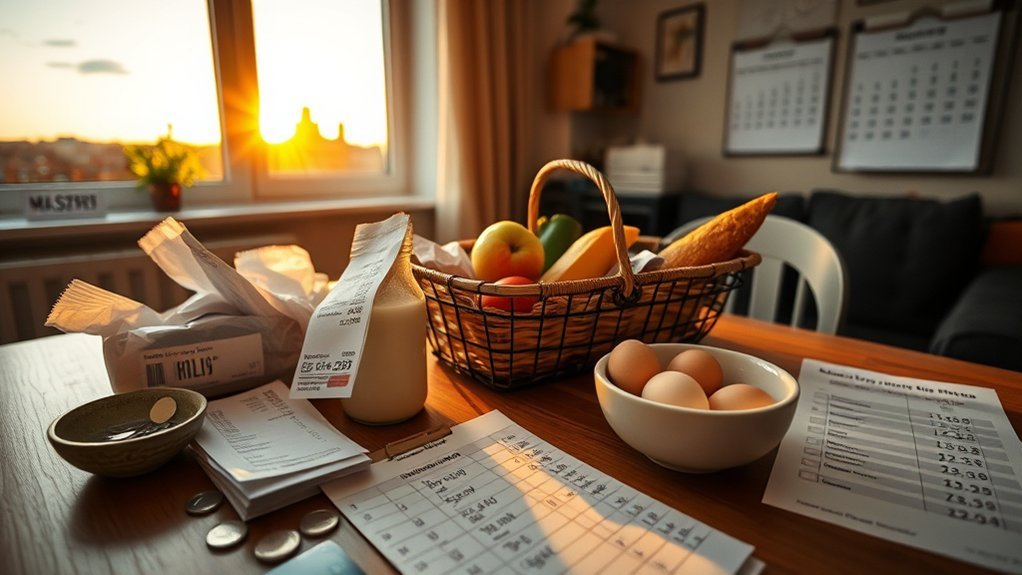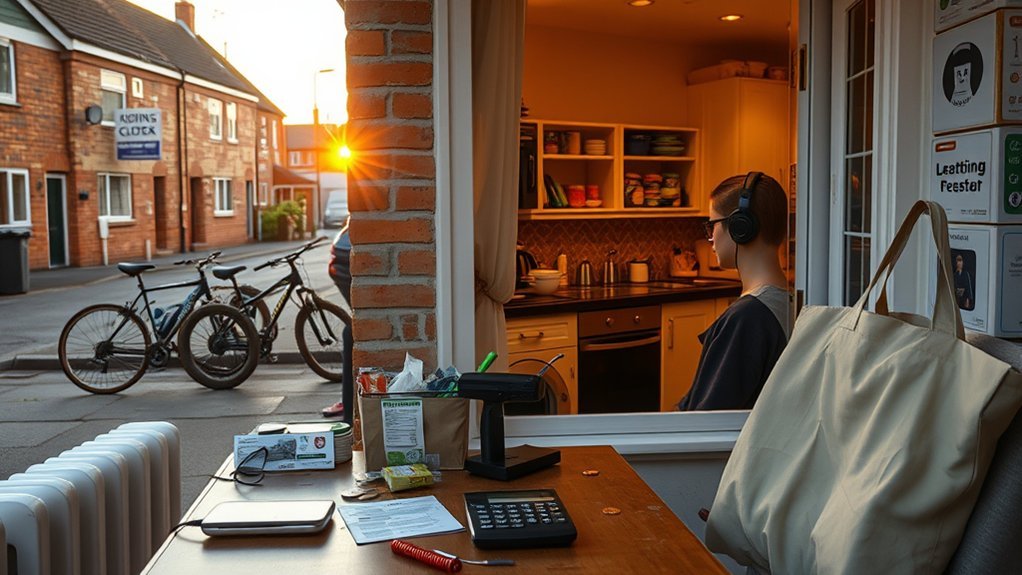Cost of Living Overview and Key Figures

Although Wolverhampton isn’t the cheapest UK city, you can still get a clear sense of what to expect: student living costs generally range from about £1,047–£1,095 monthly (some sources put a broader average at ~£1,300 excluding tuition), while a typical student budget recommendation sits near £900/month to cover essentials. You’ll find the city’s cost of living sits about 7% above the UK average, so plan accordingly. With a median after-tax salary near £2,025/month, local earnings cover roughly one and a half months of basic student-style expenses.
Although not the cheapest UK city, Wolverhampton students should budget roughly £900–£1,300/month for living costs.
Major drivers are housing and utilities: an apartment in city-centre or nearby will push your monthly spend, and utilities alone can add around £155 for a single occupant. Keep in mind that aggregated rankings place Wolverhampton among the more expensive global cities, so weigh priorities—transport, groceries, social life—against rent expectations. This overview helps you set realistic monthly targets and spot where you can trim costs.
Rent and Housing Expenses in Wolverhampton

If you want to keep living costs down, choosing where you live in Wolverhampton makes a big difference: city-centre one-bed flats average about £775/month (typically £600–£1,000), while outside the centre you’re looking closer to £650/month (£500–£800). When you’re weighing rent in Wolverhampton, shared housing can cut costs — a three-bed city-centre flat at ~£1,400/month works out to roughly £430 per person.
If you’re connected to the University of Wolverhampton, halls are a straightforward option: self-catered rooms run £107–£119/week (as of 2025/26 academic year), usually including essentials like Wi-Fi and contents insurance. Second-year students often move into studio flats, averaging ~£662/month in the centre or ~£575 outside. Moving further out can save ~25% on rent, but you’ll want to factor in transport costs (monthly passes ~£60–£82).
Utilities, Internet and Household Bills

You’ll want to budget for basic utilities—about £155/month for a typical 85 m² flat, with single-person apartments often around £70–£80 and family bills nearer £255. Broadband is commonly £25–£35/month for 60 Mbps+ and mobile plans average about £14/month for 10GB+, so factor those in when comparing rents. To cut costs, shop providers each year, use energy-efficient habits, and check whether student halls already include bills and Wi-Fi.
Typical Utility Costs
When you’re budgeting for life in Wolverhampton, plan on about £150–£165 a month for basic utilities in a typical 85 m² apartment, with family households averaging closer to £255/month; individual bills can vary between roughly £124 and £196 depending on usage and season. You’ll find that utilities—electricity, heating, water and garbage—make up a predictable slice of the cost of living, though winter heating spikes are common.
If you’re in student halls those bills are often included; private studio tenants should add about £70–£80/month. Don’t forget mobile plans (around £8–£30, typically £14) and factor in the occasional delivery or commute: the cost of transportation will add to monthly outgoings even if broadband costs are considered separately.
Internet Plans and Speeds
Though many student halls bundle Wi-Fi into the weekly rent, you’ll usually pay about £25–£35 a month for unlimited home broadband in Wolverhampton, with a typical 60–100 Mbps package costing around £29/month. Check your contract first so you don’t double up; halls (from £107–£119/week) often include it. You’ll find reliable speeds and latency suitable for streaming, video calls and remote study.
- Expect 60–100 Mbps packages for everyday use, fitting study and entertainment needs without fuss.
- Factor mobile backups: 10GB+ plans average ~£14/month if you need on-the-go access alongside home broadband.
- Budget £30–£40/month for combined services if you don’t get broadband included, keeping Wolverhampton’s low cost of living in mind and public transportation convenience.
Tips to Lower Bills
If you want to keep living costs down, focus on flexible choices that cut recurring charges without sacrificing comfort. Start by switching to a student or low-use tariff so basic utilities sit nearer £70–£80/month — turn down heating, unplug chargers, and fit LED bulbs. For internet, bundle a 60+ Mbps deal (~£29–£35/month) and shop around; swapping providers often saves £5–£10 monthly.
In flatshares you’ll split broadband and bills: a three-bed city-centre flat (~£1,300) drops per-person costs by ~25–33%, easing the overall cost of living. Cut water and laundry costs with cold washes, full loads and shorter showers to keep single-person utility bills near £155. Finally, choose SIM-only or student mobile plans (£8–£14/month) to trim telecoms for student life.
Grocery Prices and Weekly Food Budget

Stretching your weekly food budget in Wolverhampton is doable with a bit of planning and smart shopping. You’ll find the cost of food reasonable if you focus on staples: milk (1L ~£1.10), a loaf of white bread (~£1.14), and eggs (~£2.69 for a dozen). Students typically budget about £40 per week for groceries when cooking at home, which covers these basics plus rice (1 kg ~£1.50) and occasional chicken fillets (~£7.67/kg). If you eat out sometimes, expect £80–£90 per week, but frugal cooking can halve that.
- Shop discount chains (Aldi, Lidl) for lowest prices on staples and bulk rice.
- Use major supermarkets’ offers (Asda, Tesco, Sainsbury’s) for meat deals and loyalty discounts.
- Plan meals around rice, eggs, and seasonal veg to stretch portions and reduce waste.
Monthly student food costs usually land around £160–£200 with sensible shopping.
Transport, Commuting and Travel Costs

Once you’ve got your weekly food budget under control, think about how you’ll get around town and how much that will add to your monthly costs.
Once your food costs are sorted, consider transport — it’s the next big monthly expense to plan for.
If you use buses or trams, a single public transport ticket usually costs about £2.90, while West Midlands Metro and local bus singles can be as low as £1.20–£2.90 for short trips. Regional rail trips to places like Birmingham often start around £6.20 if you book ahead. If you commute daily, monthly passes pay off: monthly passes and student saver options range roughly £60–£100, with many regular monthly passes around £60–£82 depending on concessions and coverage.
Taxis start near £3.00 with fares just under £1 per km, convenient for short rides. Driving adds extra: fuel is a significant cost, so compare petrol prices to the savings from a travel pass. Work out your routes and frequency to decide whether pay-as-you-go or a monthly pass suits you best.
Entertainment, Eating Out and Nightlife

When you’re planning nights out in Wolverhampton, you’ll find pubs and bars that keep drink prices reasonable—expect about £4.50 for a pint and student venues or union bars often have the best deals. Eating out is affordable too, with inexpensive meals around £14 and a mid-range three-course for two at roughly £45–£50. Altogether, a casual night out (meal and drinks) will usually cost you about £20–£35 depending on where you go and how many drinks you have.
Pubs, Bars & Drinks
If you’re looking to unwind after classes or work, Wolverhampton’s pubs and bars make it easy to find something to suit your budget and mood. You’ll pay around £4.50 for a pint of domestic beer, but student-friendly spots and union bars often run cheaper deals and weekly events like quizzes and themed nights. Popular city-centre venues include the Prince Albert, The Royal London and George Wallis, plus late-night bars and clubs if you want to stay out longer.
- Use student discounts and union nights to lower drinking costs.
- Choose local pubs for social evenings without high dining prices.
- Expect pub prices to be markedly less than a mid-range meal for two.
These options help keep pubs, bars, and cost of living manageable.
Dining Out Costs
Pubs and bars are great for socials, but eating out and nightlife offer different costs and choices you’ll want to plan for. When dining out in Wolverhampton, a mid-range three-course meal for two runs about £45–£50, while an inexpensive restaurant meal averages £14 per person. If you grab coffee or water, expect roughly £3.30 for a cappuccino and £1.05 for a small bottle.
Fast food stays cheaper: a McMeal or equivalent is around £8, making takeaways a simple option for busier nights. Pints average £4.50, though student-union bars and local pubs often have better deals. Your habits drive costs, so students are generally advised to budget £40–£80 per month for eating out and nightlife.
Student-Specific Costs and Accommodation Options

Planning your student budget in Wolverhampton means balancing rent, bills and everyday spends so you don’t get caught out — typical monthly living costs range from about £1,047–£1,300 (excluding tuition), though many students manage on a recommended baseline of around £900/month.
Planning student life in Wolverhampton means balancing rent, bills and everyday costs — expect around £900–£1,300/month.
When living in Wolverhampton you’ll choose between university halls or private lets; halls run ~£107–£119/week (often including utilities, Wi-Fi and insurance), while studios cost ~£662/month in the centre or ~£575/month outside. Shared three-bedroom flats average £1,300/month (~£430 each), and moving further out can cut rent by roughly 25% if you accept a longer commute.
- Priorities: pick halls for convenience and predictable bills, private studios for independence, or sharings to split costs.
- Hidden costs: budget ~£70–£80/month for utilities, £29–£35 for internet, and check contents insurance.
- Food & transport: allow £40/week for basic groceries (up to £80–£90 if you eat out more); use Aldi/Lidl and student outlets to save.
Frequently Asked Questions
What is the average cost of living in Wolverhampton?
You’ll typically pay about £1,050–£1,300 monthly to live in Wolverhampton; student housing varies, local transport adds costs, grocery inflation pushes bills up, and rent plus utilities make up the biggest chunk.
What is the average cost of living in the UK per month with rent?
Want to know typical UK monthly costs with rent? You’ll usually budget £1,000–£1,800, covering student budgets, commuting costs and utility bills; you’ll adapt depending on city, lifestyle and whether you share or live alone.
Is Wolverhampton a good place to live in?
Yes — you’ll find Wolverhampton affordable and welcoming; safety perception is decent, community activities are plentiful, and transport links to Birmingham and beyond are strong, so you’ll enjoy practical amenities, cultural life, and supportive local networks.
What is the average cost of living in Birmingham UK?
Sure — you’ll pay roughly £955–£1,300 monthly (excluding rent), plus £650–£955 rent; you’ll want to watch job market trends, student housing availability, and public transport costs so you don’t get financially surprised.
Conclusion
You’ve got a clear snapshot of life in Wolverhampton now, so you can plan confidently and avoid nasty surprises. From rent and bills to food, transport and nights out, you’ll find ways to trim costs without feeling deprived. If you’re a student, look into halls or house shares early. With sensible planning and the breakdowns above, you’ll settle in quicker than you think and feel at home in this affordable West Midlands city.


